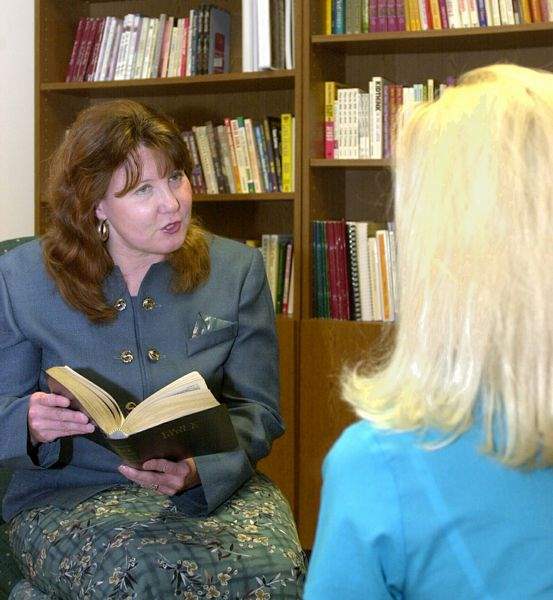
Counselors treat patients with God's Word
8/17/2002
Sue Bucher uses nouthetic counseling techniques in her role as a pastoral biblical counselor at Calvary Assembly of God.
BLADE

The Rev. Paul Walberg, associate pastor of Berean Fellowship, has used Psalms to treat depression.
Sarah Halsey had struggled for years with her young son's obsessive-compulsive disorder symptoms when she stumbled upon a solution in a place she never would have expected - the Bible.
Although she was a Christian who regarded the Bible as the word of God, Ms. Halsey never dreamed it could help a little boy who was washing his hands 40 and 50 times a day and chewing on his clothing. Medication had taken the edge off her son's symptoms and made him a little more manageable, she said. “But it really did not take care of the problem.”
After seeing three doctors and a psychologist, what finally helped her then 6-year-old son, Jordan, she said, was “nouthetic counseling,” a Bible-based approach that uses scripture to discern unbiblical thinking and behavior, lovingly talk to the person about it, and help him or her solve the problem in question. Nouthetic is taken from two words used in the Greek New Testament: the verb noutheteo, which means to teach, admonish, warn, or instruct, and the noun nouthesia, which means instruction, admonition, or warning.
Ms. Halsey said in nouthetic counseling sessions with the Rev. Paul Walberg, associate pastor of Berean Fellowship, her son learned what the Bible said about his obsessive behavior.
For example, when Jordan, who had made a commitment to Christ about a year earlier, explained that he washed his hands frequently because of the fear of germs, Mr. Walberg pointed out scripture verses that instruct Christians not to be afraid, to take every thought captive, and to fill their minds with the truth and good things. One of those truths, he said, was that a single hand-washing killed the germs and that repeated washings didn't necessarily make them more clean. In addition, he told him that repeated hand-washing was the kind of idle behavior God considers a waste of time.
“There was nothing fabulous about it, no bells or whistles or anything unusual,” Ms. Halsey recalled. “He just got out the Word and started talking to Jordan.” Her son also received homework assignments so that he could apply the verses himself.
After about six weeks, she said, her son was off his medication and had stopped his obsessive chewing and hand-washing.
Six years later, Ms. Halsey said, Jordan continues to do well. “He has good internal control now and he is fully aware that he gets this through Christ. And he just smiles, he's just so happy to be free of this.”
Nouthetic counseling was developed about 30 years ago in response to the 1970 book, Competent to Counsel, by Dr. Jay Adams, said Randy Patten, executive director of the Indianapolis-based National Association of Nouthetic Counselors, which was founded in 1975 as a training and certifying organization.
“That was a bomb in the evangelical church world because it was a strong rebuke to pastors for not caring for people and helping them to solve problems. It called pastors back to using the scriptures to help people.”
Before then, with the rise in prominence of psychology, Mr. Patten said, pastors were being discouraged from doing counseling and advised instead to refer problems like depression to secular or Christian mental-health professionals.
Nouthetic counseling differs from other methods in that it is strictly biblical and does not employ psychological therapeutic techniques or terminology. For example, Mr. Patten said, “I don't talk about a panic attack, I talk about fear. I don't talk about alcoholism, I talk about drunkenness. It's not sexual addiction, it's fornicating and adultery. The way you choose to talk about problems heads you in a direction of solutions.”
The method also departs from conventional therapies in the area of drug therapy.
Clients who are already on medication when they come to see a nouthetic counselor would not be advised to cease taking drugs, Mr. Patten said, but after several sessions, a counselor might suggest that a client making progress see his or her doctor about the possibility of reducing or eliminating the medication.
Dr. Robert D. Smith, a retired Lafayette, Ind., physician who was a founding board member of NANC, said he doesn't think anyone who uses the Bible as his or her authority needs drugs for mental-health problems.
He regards the Bible as an “operator's instruction manual straight from the manufacturer.”
“We believe and the Bible teaches that it has a superior answer to anything human reason can come up with, because it's from the manufacturer.”
Nouthetic counseling emphasizes the scriptures as sufficient for dealing with all the problems in people's lives unless there is a clearly documented medical or organic cause, Mr. Walberg added.

Sue Bucher uses nouthetic counseling techniques in her role as a pastoral biblical counselor at Calvary Assembly of God.
The Rev. Robert Thacker, a counselor at Toledo's Samaritan Counseling Center, said he and other counselors at the center will use scripture if a client asks for it, but that he has rarely had such a request.
“What most people appreciate about our type of counseling is they generally come in for emotional problems, but they're looking for someone who understands their perspective and value system on religion.”
He said he thinks the Bible is valuable as a resource, but that he considers it important to use both spiritual and scientific insights into human behavior in counseling.
Providing biblical or nouthetic counseling is not just a matter of knowing the Bible, Mr. Patten said. Even pastors with strong biblical training may not be able to apply it in counseling.
“Many people have been taught the Bible and they know a lot about the Bible. They know facts and stories, but they've been taught it as a book of facts, not as an owner's manual on how to handle life.”
In his own case, he said, despite excellent biblical training at a Christian college and in the seminary, he was unprepared to help the people who came to him for help when he was a new pastor. Two years later, he took an 11-week training program in nouthetic counseling. “It revolutionized my life and my abilities to help people.”
Berean Fellowship's Mr. Walberg, who would like to see a nouthetic counseling center started in Toledo, said the practice goes beyond giving people scripture verses to quote.
“Nouthetic counseling is work; it's hard work. The counselor really has to work at understanding what is the root problem. We're trying to be able to give a problem a biblical name. If we can give something a biblical name, then we can address it. Once we've identified it, we have to accurately, correctly, and gently minister the scriptures to the person in a way that they can begin to change.”
Mr. Patten said nouthetic counselors depend on the client to do his or her homework. “Biblical counselors do not view the hour they spend with us as the magic hour. They're not going to get changed in our room. We point them toward the proper thinking, the proper behavior, and we give them through the homework some precise practical steps on how to go about changing and growing.”
One of the first assignments he often gives is to read the fifth, sixth, and seventh chapters of the book of Matthew, which he said are filled with practical teaching from Jesus Christ on how to deal with people and problems.
Mr. Walberg said he has used Psalms 38 and 51 for clients with depression because they clearly describe the feelings of someone who is depressed. In the two Psalms, David is depressed because he violated God's will, because he was attacked by other people, and because of how he responded to the attacks.
Even when depression is caused by the actions of another, Mr. Walberg said, “The Bible teaches us that God holds us responsible for how we respond to what others do to us ... God is saying people will wrong you, will hurt you, and your circumstances will at times be tragic, but if you're my child, I'm going to give you the resources to respond to that correctly.”
Sue Bucher, a pastoral biblical counselor at Calvary Assembly of God, said she used a verse in the book of Philippians to help a woman who came to her for depression. The verse tells Christians to meditate on things that are pure, holy, good, and true. “It helped her change her mind-set,” Mrs. Bucher said. Eventually, she said, the woman was able to stop taking medication.
Mrs. Bucher said because a major hallmark of nouthetic counseling is admonishing and correcting, she told the woman that her self-pitying thoughts were sinful and urged her to replace them with thoughts of hope.
Since nouthetic counseling is designed for Christians, clients who are not Christians will be given an evangelistic message in the first session or two, Mr. Walberg said.
“The nouthetic counselor's first job is evangelism: to proclaim the need for Christ and encourage the person to make a choice for themselves. Without that, the rest of counseling will only be on surface issues.”
Mr. Walberg said nouthetic counselors depend on the Holy Spirit, sometimes called “the counselor,” to be at work in their lives and those of their clients.